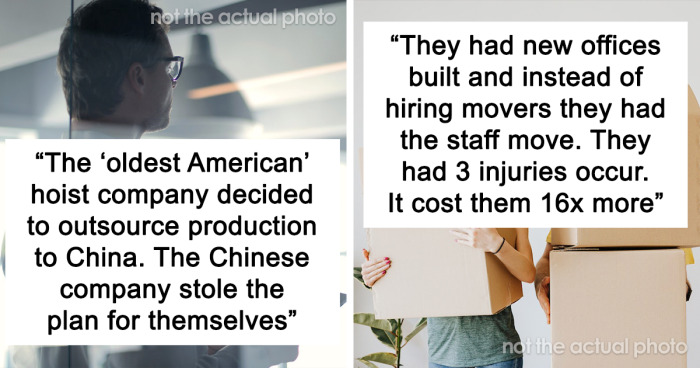When Cheaping Out Backfires: 25 Companies Who Paid a Hefty Price for Cutting Corners
 The roof of our building was leaking bad. Got quotes for doing just a third of the roof and for doing a whole new roof. They choose to do third of the roof. All it did was move the leak. A month later they did the whole roof. They would have paid a lot less had they done it right the first time.
The roof of our building was leaking bad. Got quotes for doing just a third of the roof and for doing a whole new roof. They choose to do third of the roof. All it did was move the leak. A month later they did the whole roof. They would have paid a lot less had they done it right the first time.
A company I worked for (a fortune 500 company) was having a hard time getting employees for 8.00 an hour, our competitors started at 10.00 an hour at the time, this was 5 years ago. Someone at corporate had the bright idea to stop using preemployment drug screening, allowing the positions to be filled by people who we normally would disqualify. This company was a national auto parts chain, and we had a fleet of delivery trucks, there were so many accidents both inside and outside of the stores over the 18 months that they did this. Through lost productivity, theft, and several liability lawsuits the company lost millions of dollars even enough to affect its stock prices.
 I work at an industrial plant in a rural area. We require water to operate- some to flush the toilets, but also some for certain cleaning operations that we do. We could have a water well drilled for about $30,000 and it would easily supply all of our water needs. Instead, we have water brought on site, sometimes twice a week at $240 per trip. A year ago I asked my boss why we didn’t just get a well. His boss didn’t want to spend the money. He also said that he stopped keeping track after water delivery would have paid for three water wells. There’s also equipment we have that is undersized and bottlenecks our process, but we got it really cheaply so we will make do. We also pay the lowest wages in our industry. In a year, we have had 60% turnover because everywhere else pays more. Then when someone leaves for more money we have to use overtime to cover for them and spend money training someone new. If we paid people more to start with and retained our staff then we would probably spend the same overall on wages and have a better trained staff. Lastly, our plant uses a certain chemical for our production. If we run the plant at a medium pace, most of the chemical can get recycled in the process and we lose very little. If we are told to run the plant faster, we gain more output of the end product but the chemical is consumed rather than being recycled. As an example, if our slower production produces 30 units to 1 unit of chemical, the faster production yields 50 units to 5 units of chemical. Of course the chemical is much more expensive than our end product, so each unit is much less profitable.
I work at an industrial plant in a rural area. We require water to operate- some to flush the toilets, but also some for certain cleaning operations that we do. We could have a water well drilled for about $30,000 and it would easily supply all of our water needs. Instead, we have water brought on site, sometimes twice a week at $240 per trip. A year ago I asked my boss why we didn’t just get a well. His boss didn’t want to spend the money. He also said that he stopped keeping track after water delivery would have paid for three water wells. There’s also equipment we have that is undersized and bottlenecks our process, but we got it really cheaply so we will make do. We also pay the lowest wages in our industry. In a year, we have had 60% turnover because everywhere else pays more. Then when someone leaves for more money we have to use overtime to cover for them and spend money training someone new. If we paid people more to start with and retained our staff then we would probably spend the same overall on wages and have a better trained staff. Lastly, our plant uses a certain chemical for our production. If we run the plant at a medium pace, most of the chemical can get recycled in the process and we lose very little. If we are told to run the plant faster, we gain more output of the end product but the chemical is consumed rather than being recycled. As an example, if our slower production produces 30 units to 1 unit of chemical, the faster production yields 50 units to 5 units of chemical. Of course the chemical is much more expensive than our end product, so each unit is much less profitable.


















Post Comment